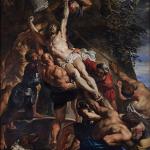In the midst of incredible tragedies such as the Texas shooting in a Sutherland Springs church, society seeks a scapegoat. Inevitably, the police reports will be combed over by eager citizens, looking for any indication of a motive behind Devin Kelley’s actions. News agencies across the country have already started speculating to the nature of his crime. The venerable sages on social media have determined the issue at hand: it’s the guns; it’s a lack of mental-health awareness; it’s his dishonorable discharge from the military coupled with sociopathic tendencies toward animals. Yet few will stop to determine Kelley’s condition is one common to every man: sin.
We have an innate propensity to dispense cheap solutions which never address the heart of the matter. We form scapegoats to the problem of evil – for it is far easier to look upon the things that come from without than the things from within. We address the fruit rather than the root, and collectively, send our bushels outside of the camp to be burned. These scapegoats suffice until another deadly attack happens, to which we simply dust off the well-worn hobby horse and send it once again on the way to martyrdom. The person committing murder intrinsically knows they are about to kill an image bearer, just as all of us do. There is little confusion in assessing if murder is an appropriate action.
To be sure, many will lament over the lack of firmer restrictions on guns. Others will express the need for further funding to be given to facilities tasked with researching mental illness. In either of these cases, I genuinely believe people sense they are looking at the root issue. They genuinely believe that if strict regulations were in place, less people would die. We ought to recognize, however inconsistent such an approach to valuing life may be, it is good they desire less bloodshed from the ill-fated. Noble though such desires may be, they neglect to understand the proper object of such heinous acts, nor a simple truth on the nature of mankind. Men are moral monsters.
The subtle difference between the sins of thought and those carried out in deed is the restraining hand of the Spirit. Remove that restraint from any of us and the evil within culminates in barbaric ways. One needn’t look very far to see this principle demonstrated throughout the history of mankind. Each culture has given itself to acts of barbarism – and many still afford such things under the auspices of bodily autonomy. This is at the heart of the issue, for we excuse one act of barbarism while we demonize another. We make one man a hero whilst we identify another as a monster, neglecting to see the blood upon our own hands. Not all men are given to such extremes as Kelley, yet our hearts are filled to the brim with other forms of socially acceptable evils.
You see, the depiction we give to monsters is incredibly unrealistic. We fancy ghouls and imagine them as the common man’s enemy. Even when we bridge the gap and demonize dictatorial regimes, we still write ourselves on the side of the “good guys”. The frightening thing about men like Hitler, Stalin, Pol Pot, Mao, etc., is not the men themselves, but the masses of seemingly insignificant people who clamored to their aid. Or perhaps we venture a little closer to our own native soil and look to the devastation wrought by colonial slavery. Even closer to home and we find immense evil if we are familiar with the dark past of Waco, Texas.
We tend to look to the results of an action to determine morality rather than objectively determine whether or not such acts are moral in and of themselves. However, ethics aren’t subject to pervading, cultural ideals, nor are the proposed solutions adequate to fix the actual issue at hand. Such systems are fraught with peril and inevitably collapse upon themselves simply because the Law of God is written upon the hearts of mankind. It is this universal principle which plainly reveals each man to be culpable; there is no secular scapegoat capable of removing this indictment.
Monsters are ordinary people. They are fathers and mothers, sons and daughters, civil leaders and church members, and the famous and insignificant alike. Monsters are those whom were delighted to take a picture of their children next to hanged black men – and then return home to an ordinary meal with their ordinary family. They are those whom marched the Jews off to concentration camps for experimentation and extermination – and then held their daughter’s hand as she played in the street. Genuine monsters are even the indifferent, who shrug at evil and wink at sin.
We don’t like to look at these types of pictures because we dehumanize villains. Modern audiences can’t quite wrap their heads around the fact that given the circumstances, many would likely not even bat an eye. The masses are happily slaughtering untold children in their mother’s womb – yet decry those who would simply say murdering the innocent is not befitting of the human race. In the midst of great wickedness, we turn and find the scapegoat to avoid genuine introspection of the individual. Guns. Mental illness. Republicans. Democrats. Pick your poison.
The list is easy to generate when we target demographics rather than the soul. Targeting the soul of man would betray our conception of monsters, and we like our monsters because they distract us from the genuine problem. These inventions are far easier to deal with than the condition of our own heart. Concocted monsters are far easier to slay than those within our own heart. Someone else’s sin is easier to scapegoat than to recognize its pervasiveness and destruction in our own lives. Harvesting bad fruit is far easier than uprooting the poisoned limbs. Generating a scapegoat that refuses to deal with the spiritual problems of sin and evil allows us to express condolences, blame-shift, and move along with our merry, little lives.
Inevitably, another incident will come up in the future because if there is one guarantee in this life – there is surely going to be more death and more twisted people doing twisted things. We know the effects of sin and death so well, yet scarcely stop to recognize what is actually driving this world toward destruction. We curiously wring our hands and marvel at what could have possibly driven the Texas shooting, all the while staring straight in the eyes of the answer every time we face brokenness, wickedness, calamity, and death in our own lives.
We cannot form a scapegoat and ignore the genuine issue, lest we minimize the genuine solution in Christ Jesus. It is sin. It has always been sin – ever since the eyes of Adam and Eve were opened as they ate of the fruit. So long as the Lord tarries, it will continue to be sin, just as it was when the blood of Abel cried out to the Lord.
Thankfully, the blaze of bullets in the Texas shooting is not the final word in the story for Kelley’s victims. For those in Christ, they are in the Lord’s presence at this very moment. There is no more terror, pain, sickness, death, and the effects of sin. They have been embraced in the bosom of their Savior and will remain there for all eternity, singing His praises and His goodness. These men, women, and children were met this Sunday by their enemy and to the undiscerning eye that enemy won. In the midst of the time consecrated to the Lord, a man – a sinful man – came to destroy image-bearers, yet he could not destroy the soul preserved by God.
Let us weep and weep bitterly with the community in Sutherland Springs, yet let us not grieve without hope. Let us especially say with our brothers and sisters of First Baptist Church: maranatha.

















